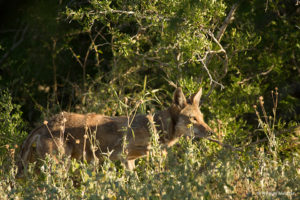 Coyotes are common throughout Texas and are expanding their range throughout North and Central America, which has led to human-wildlife conflict in rural and urban areas alike. Considered a non-game species in Texas, coyotes are susceptible to being hunted year-round on private property. Coyotes serve a role as an apex predator in systems void of other large carnivores. Working alongside our partners at the East Foundation, we are provided with the unique opportunity to study how a predator population operates when human interference is minimal. Since 2017, TCEL has been fitting coyotes at a 150,000 acre cattle ranch in South Texas with GPS collars to collect spatial and activity data. As part of this project, we are examining how coyotes react to extreme climatic events, identify key habitat or seasonal characteristics that influence space use when two or more individuals overlap in a given area, evaluate movement behavior in response to white-tailed deer fawning season, and analyze consistency or changes in utilization distributions for individuals during one or more years. This long-term project contributes to the growing body of coyote movement ecology literature, and provides insight into the management of a common mesocarnivore.
Coyotes are common throughout Texas and are expanding their range throughout North and Central America, which has led to human-wildlife conflict in rural and urban areas alike. Considered a non-game species in Texas, coyotes are susceptible to being hunted year-round on private property. Coyotes serve a role as an apex predator in systems void of other large carnivores. Working alongside our partners at the East Foundation, we are provided with the unique opportunity to study how a predator population operates when human interference is minimal. Since 2017, TCEL has been fitting coyotes at a 150,000 acre cattle ranch in South Texas with GPS collars to collect spatial and activity data. As part of this project, we are examining how coyotes react to extreme climatic events, identify key habitat or seasonal characteristics that influence space use when two or more individuals overlap in a given area, evaluate movement behavior in response to white-tailed deer fawning season, and analyze consistency or changes in utilization distributions for individuals during one or more years. This long-term project contributes to the growing body of coyote movement ecology literature, and provides insight into the management of a common mesocarnivore.